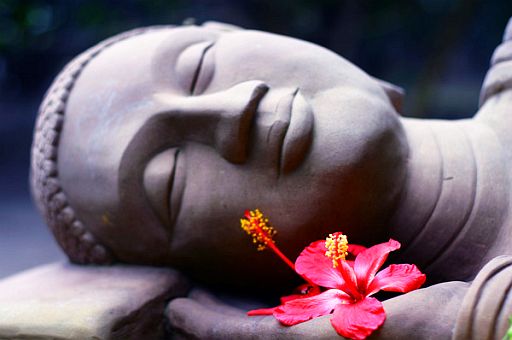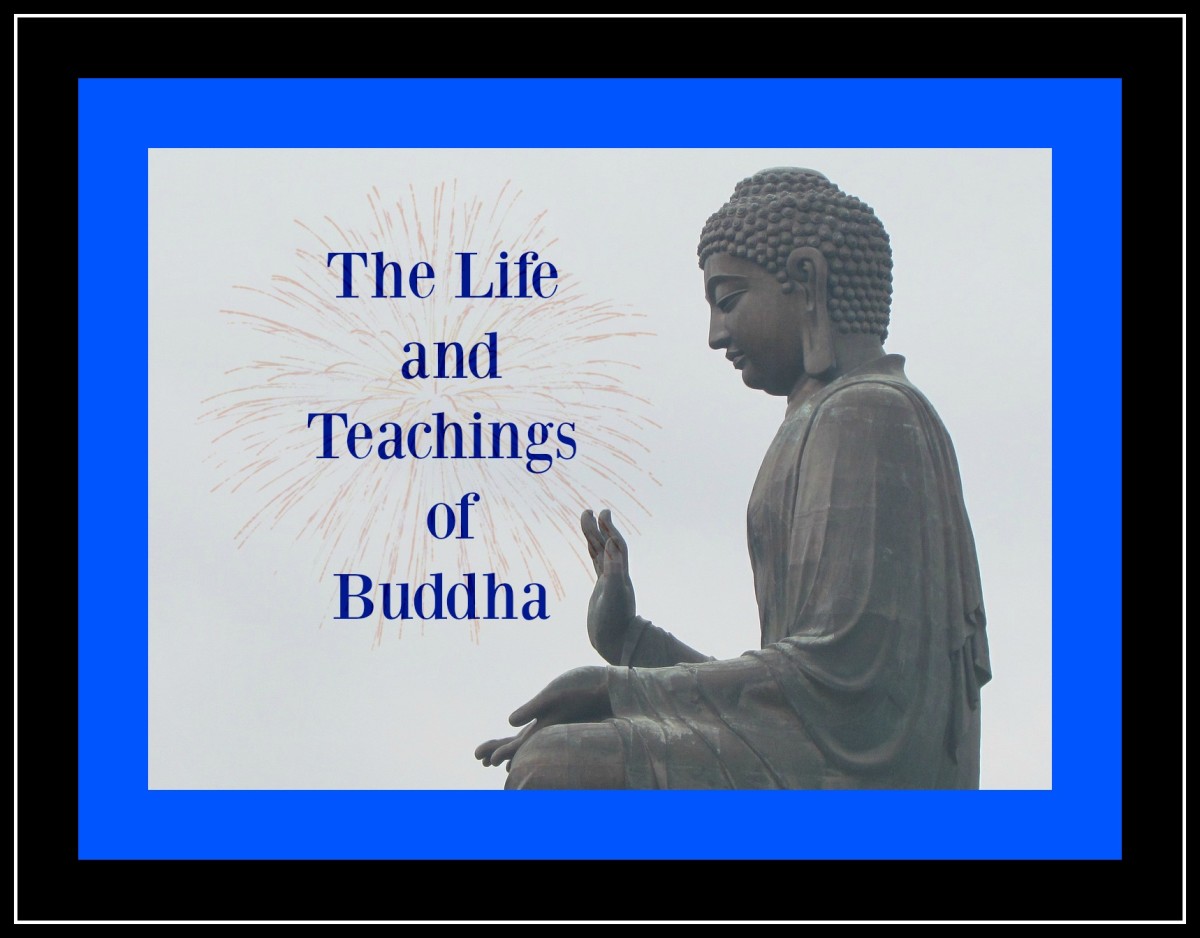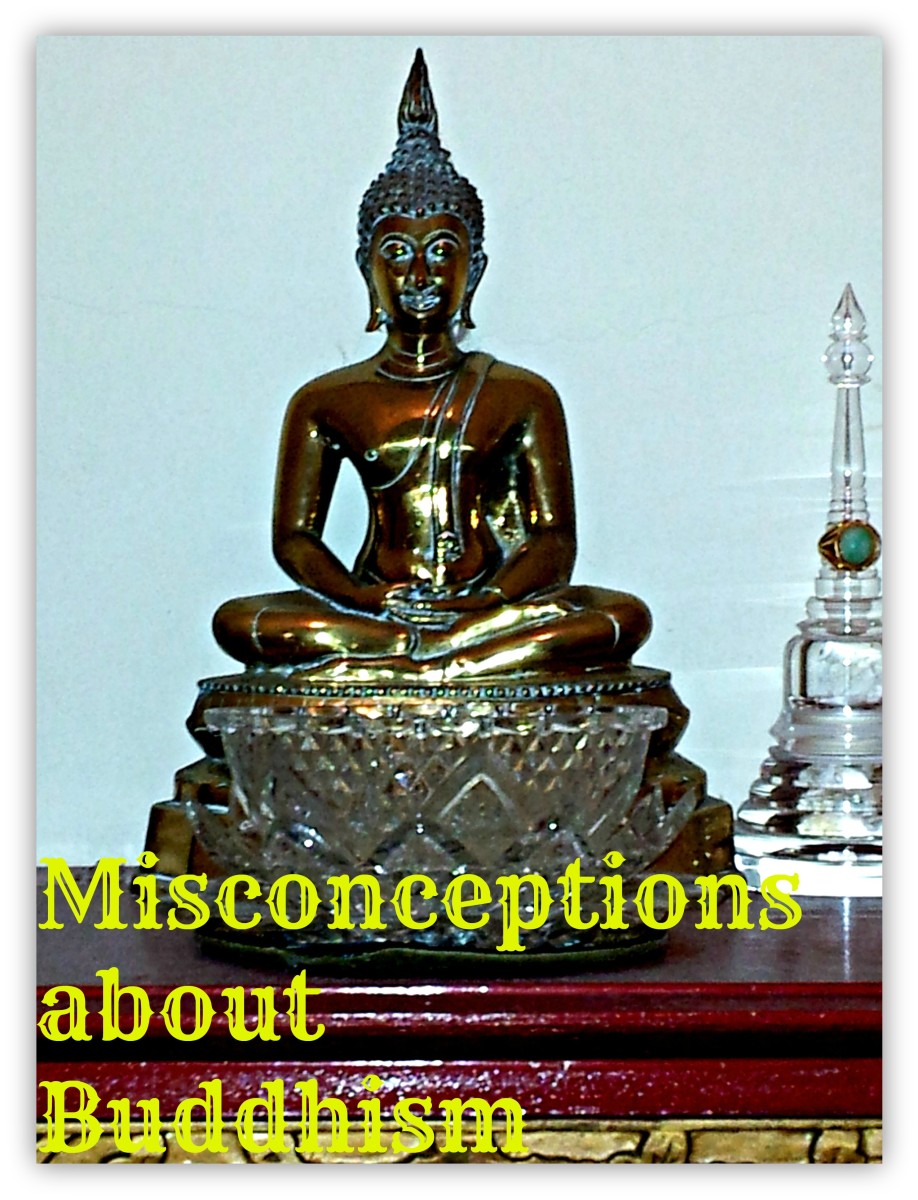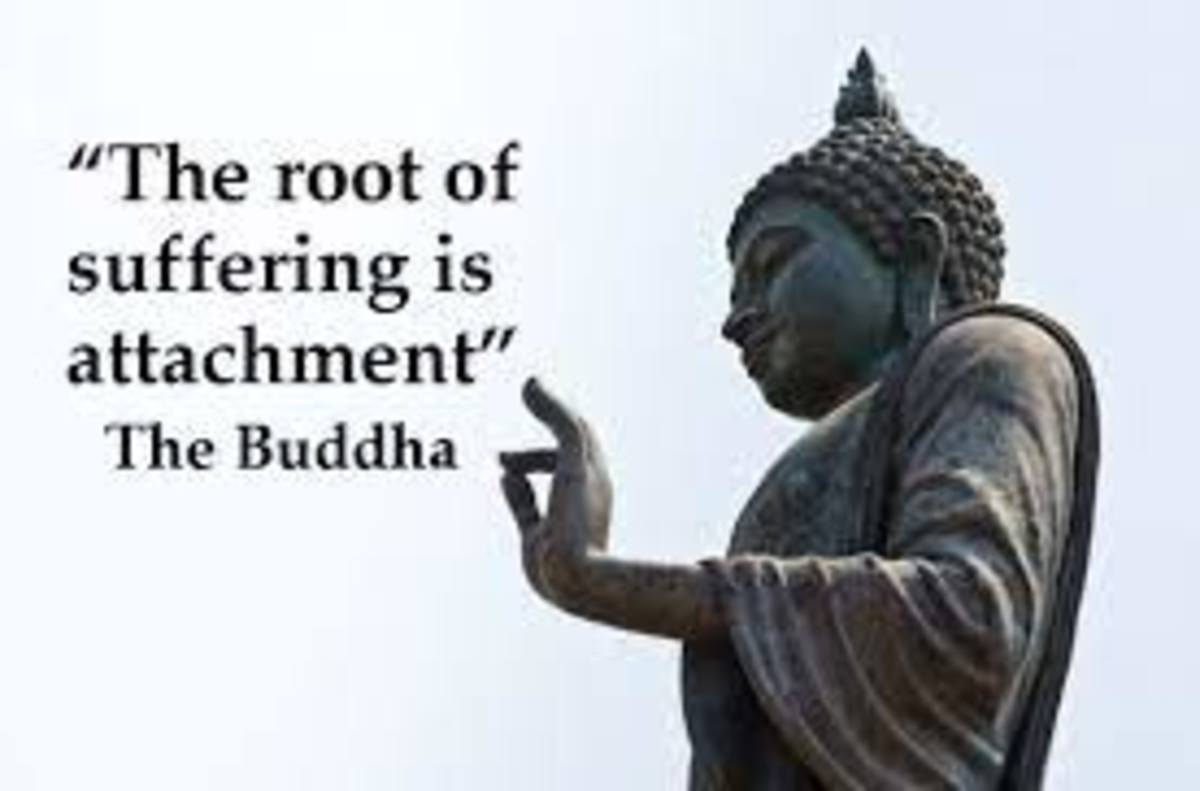The Ten Perfections (Paramis)
The Ten Perfections or Paramis
1st: Generosity: Practicing generosity supports freeing the mind of defilements. It is a basis of wholesome karma or merit. The Buddha taught that good wholesome deeds, acts, or thoughts would bring us happiness. This is the law of karma; cause and effect. How much merit we gain depends on where our minds were or our motivation, the size and kind of gift, and the purity of the receiver. Our actions create karma. Good deeds, thoughts, and actions will lead to good karma. Bad deeds, thoughts, and actions will lead to bad karma. Knowing this we should want to create as much good karma or merit as we can and do so with a pure mind, selecting worth recipients, and choosing the right gift which one can afford. One gift that we can afford is offering our time and true presents to someone. This is the greatest gift we can offer. Certainly we can afford this kind of gift. We can also offer loving-kindness to others. Wish others well-being. You will begin to see the joy of giving as you practice.
2th: Ethics or Virtue: Ethics is developing our way of interaction. Right speech, right action and right livelihood from the noble eightfold path have to do with ethics. How do we act? How do we speak? How is our interaction with other beings? Some qualities of right speak are speaking the truth, not talking about others if they are not present, not idling in speech or talking about things that have no relevance, not gossiping and, not speaking harshly. Right livelihood has to do with choosing a job that does not harm others, does not involves lying, and does not involve trading human-beings. If we do things that involve greed, aversion, or delusion we will not be able to become free. Right action is connected to the Five Precepts. They are No killing, No stealing, No sexual misconduct, No lying, and No intoxicants. The Buddha gave the Five Precepts to us to be as rules or practices that we follow.
3rd: Renunciation: To renounce is to give up something or let go. In this sense you are renouncing to get something better. For example you can renounce certain qualities of the habitual mind, qualities that include anger, aversion, hatred, depression, anxiety, irritability and so on. Renunciation is connected to wisdom in a way that there has to be some wisdom present for the renunciation to occur. Its kind of a realization that this quality is not helpful so I am going to let it go. We can renunciate the bad qualities, then plant seeds for the good qualities and water them to promote their growth. You can think of renunciation as pulling a weed. We see that by letting go and pulling these particular weeds we can achieve a greater happiness.
“If one sees that a greater happiness is found by letting go of a lesser one, the wise person would let go of the lesser happiness.” Buddha
4th: Wisdom or Discernment: Wisdom is the deep intuitive understanding of how things really are unfiltered by our distorted perceptions. It sees the conditions that lead to something happening like certain trains or conditions of the mind lead to suffering or aversion. With wisdom we will see that anger, greed, hatred, aversion all lead to suffering and loving-kindness, compassion, good will lead to happiness. We can begin to release certain concepts, and views that are distorted with wisdom. Its like a release of tension surrounding certain deluded thoughts, and ideas we held. This release will bring calmness and peace in the mind. Wisdom is like a light shining on darkness. Wisdom allows the other paramis to flourish. Understanding the true nature of life in a deep way that changes our mind is wisdom. We need to discern the difference between thoughts and concepts from the the present moment and what is actually unfolding. Having mindfulness of the present moment brings about wisdom slowly. So wisdom is connected to patience and energy. We can expect wisdom to come over night. This means we must be patient and put forth energy in our practice.
----Wisdom is a training of the mind which slowly wears away at distortions, unskilful habits, and unskilful behaviors. Wisdom is the recognition of the need to remove unskilful habits and replace them with skillful habits. When we cultivate skillful habits this leads to a greater wisdom.
5th: Energy or Effort: Energy is the cultivation of energy to follow the path. We need energy to cultivate the ten paramis. Without energy we could not attain enlightenment. A way to cultivate energy is having a spiritual urgency to be free of suffering knowing there must be some other way other than suffering. Energy is required to cultivate wholesome qualities like kindness, compassion, equanimity and renounce unwholesome qualities like greed, aversion, depression, and impatience. There are four kinds of efforts which are effort towards the non arising of unwholesome states that have not arisen, effort towards the abandoning of unwholesome states that have arisen, effort toward the arising of wholesome states that have not yet arisen, and effort towards the sustaining wholesome states that have arisen.
6th: Patience or Endurance: Patience is needed for our practice. We must understanding that our practice is a slow process. It takes time, just as it takes time to grow crops. They don’t come overnight and they require action like watering. Patience does not resist what we are experiencing. When we resist it only causes us more pain so we must accept things as they are. Patience knows that due to causes and conditions this is the way it is. We learn to patiently be present with our experience even if it is difficult. Difficult emotions arise in our mind and in our practice we are suppose to watch the emotion be it anger, anxiety, disappointment. It take patience to stay with these mind states. In the midst of experiencing a difficult emotion it may seem that it never ends, though over time as we consistently watch it with wise mindfulness it will start to denigrate. In Buddhism practice we are essentially reconditioning our mind or training our minds. As we continue to practice over a few years we will begin to notice changes. Perhaps we are not as angry or reactive in life. Without patience we would not be able to get anywhere in our practice because it takes time to develop the mind in a way that is non-reactive, non-judgmental, and non-violent.
7th: Truthfulness: Have truthfulness with ourselves and others. Ask what is it that is really going on here not what I wish were going on? We deceive ourselves a lot. We have certain views, ideas, and concepts in which we see our experience. A lot of these views are distorted. To be truthful with ourselves we can start to investigate and see where we have distortions that are not the truth. One of the ways we distort ourselves is by taking things that are impermeant to be permanent. We will start to cling to things thinking it is what will bring us happiness and then it falls apart due to impermanence and we suffer in our mind. One what we thought would bring us happiness falls apart we start to reconstruct our world again in a way we think will bring happiness. We use most of our energy doing this. What we don’t realize is that we have everything we need right now to be happy. Staying true to ourselves and others is the practice of Buddhism. Dharma is a synonym for truth so when we speak of dharma practice it translates to truthful practice or living truthfully.
8th: Determination or Resolve: We must have determination to continue the practice. In the teachings of the Buddha there are four resolves. Four things to be resolved about to deepen your determination and they are truth, discernment, or wisdom, generosity, and peace. We must stay truthful with ourselves and others. The power of truth can set one free. Discernment or wisdom is to see clearly. Generosity was taught by the Buddha many many times. He says it brings about happiness. Peace is to not have conflict with ourselves or others. If we have conflict with others it may be a reflection of the conflict going on inside ourselves. This ties in with truth. For there to be no conflict one would have to be truthful and not resistance of the truth. Resistance would be conflict. So one must accept the truth for what it is; not wishing it be different.
9th: Loving-kindness: Developing and attitude towards our experiences of kindness and acceptance. Buddhist practice of loving-kindness is meant to replace unskilful states of mind such as anger, or hatred. The Buddha said there are 11 benefits from practicing metta.
-
One sleeps peacefully
-
One wakes peacefully
-
One dreams no evil dreams
-
One is liked and loved by all human beings
-
One is liked and loved by all non-human beings too
-
One is guarded and protected by the divine Devas
-
One cannot be Harmed by Fire, Poison, or Weapons
-
One swiftly attains the concentration of absorption
-
One’s appearance becomes serene, calm, and composed
-
One dies without confusion
-
One reappears after death on the Brahma level if one has penetrated to no higher level in this very life
With loving-kindness practice we start with ourselves. Really wish ourselves well-being. May I be peaceful and light in body and spirit. May I be safe and free from harm. My I be free from anger, anxiety and all afflictions. May I live with ease. Once we have send metta to ourselves we send it to a loved one, then to a neutral person, then to someone we are having difficulty with, and finally to everyone, without judgement.
!0th: Equanimity: Equanimity is developing a mental calmness, and tranquility so we are able to stay steady as the worldly wind blow us around. We remain balanced regardless of life circumstances. The equanimous mind is not reactive, but responsive. Equanimity perfects loving-kindness because loving-kindness is open, patient and accepting of how things are. When there is resistance equanimity is not possible. The resistance would be aversion in the mind knocking equanimity out of place. When we are balanced there is no aversion. A good way to cultivate equanimity is the practice of mindfulness. When you are mindful, you experience things without judgement or distortion. Mindfulness then strengthens concentration. When we are concentrated we develop a calm relation towards things as they change which brings equanimity. With equanimity we see that everything happens a a result of causes and conditions. We stop wishing for things to be another way than what they are.
The ten qualities or perfections we practice will support meditation and the path to freedom or liberation.

Beliefs or Practices
The Buddha taught several teachings. Theses teachings where not made just to believe. The teachings where the Buddhas way of inviting us to explore and see what we notice in our own experience. The Buddha says don't believe something because you heard it or read it believe because you know it thorough your own experience. Try and see what these ten qualities do for you when generated.
Guided Meditation

Lotus Flower
Just as a lotus flower grows out of mud we can grow from our suffering and blossom into something beautiful.
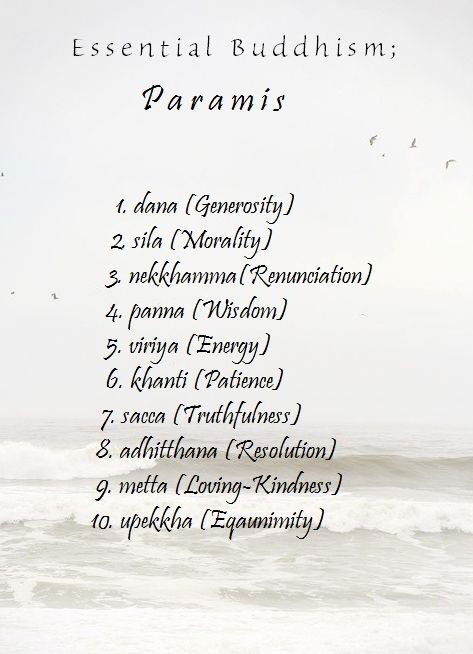
Ten Paramis
